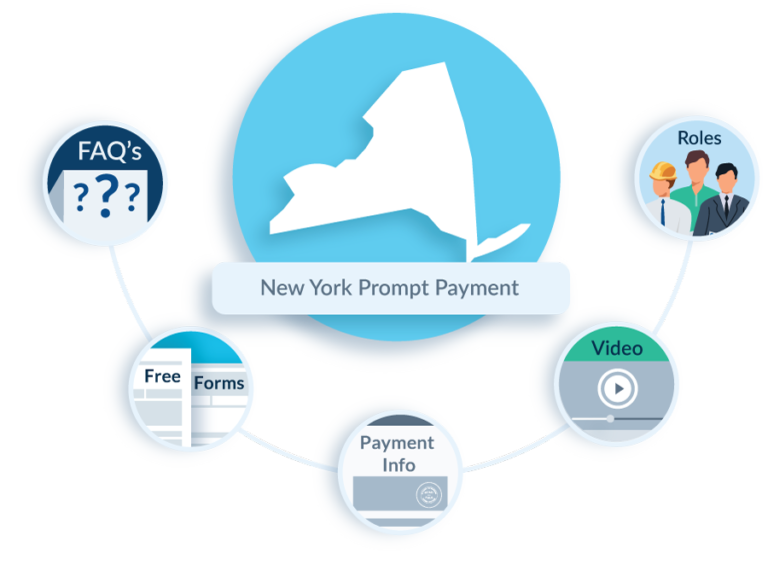New York Prompt Payment Requirements
- Private Jobs
- Public Jobs
- Top Links
Prime Contractors
For Prime Contractors, progress payment must be made within 30 days of approved invoice (invoice must be approved within 12 days of receipt). Final payment due within 30 days of final approval. Both may be modifed by contract.
Subcontractors
For Subcontractors, payment due within 7 days after payment received from above.
Suppliers
For Suppliers, payment due within 7 days after payment received from above.
Interest & Fees
Interest at 1% month
Prime Contractors
For Prime (General) Contractors, generally, payment due 30 days after invoice; however, modified for some projects: payment due within 75 days of invoice for highway project. For New york City projects, progress payments due within 30 days of invoice, and 60 days after invoice for final/retianage payment.
Subcontractors
For Subcontractors, payment due within 7 days after payment received from above.
Suppliers
For Suppliers, payment due within 7 days after payment received from above.
Interest & Fees
Interest at statutory rate
Prompt payment laws are a set of rules that regulate the acceptable amount of time in which payments must be made to contractors and subs. This is to ensure that everyone on a construction project is paid in a timely fashion. These statutes provide a framework for the timing of payments to ensure cash flow and working capital.
Projects Covered by Prompt Payment in New York
The state of New York’s prompt payment provisions are split into two sections, covering both private and public projects. These statutes govern the timing of all payments on construction projects, and impose penalties for late payment in the form of interest.
Private Projects
Private projects in New York are governed by NY Gen. Bus. Law §§756 et seq. These statutes apply to most private construction projects whose aggregate cos is $150,000 or more. There are some exceptions concerning residential projects. The regulations will not apply to residential projects of 3 or less units, residential tract developments of 100 or less 1-2 family dwellings, or any residential project where the aggregate size is 4,500 sq. feet or less.
Payment Deadlines for Private Projects
On private construction projects, once a prime contractor has submitted a pay request to the owner, the owner will have 42 days to make progress payment. These 42 days include 12 days to approve the request, and then 30 days to release payment. Final payments to the prime contractor must be made within 30 days of final approval of the project. These payment deadlines may be modified by the contract between the property owner and the prime contractor. Also, if there is a lender on the project, and they fail to disburse the loan funds in a timely manner, the owner will have a time extension.
Once the prime contractor has received payment from the owner, they must release payment to their subcontractors and suppliers within 7 days. This same 7-day deadline applies to all other payments down the chain.
Penalties for Late Payment on Private Projects
New York allows payments to be properly withheld under certain conditions. If none of these conditions exist, and payment is either late or wrongfully withheld, interest will accrue at a rate of 1% per month until the payment is made; or at a higher rate established in the contract.
Public Projects
New York has multiple sets of statutes that regulate public works projects, depending on which public entity contracted the project. These statutes are found in NY State Fin. Law §§139-f and 179-f, Gen. Mun. Law §106-b, NYC Procurement Policy Board Rules §4-06, and Pub. Auth. Law §2880.
Payment Deadlines for Public Projects
State Contracts
Once the state agency has received a proper request for payment, they must pay the prime contractor within 30 calendar days. For small businesses, this deadline is reduced to just 15 days excluding legal holidays, and for highway construction contracts, this deadline is increased to 75 calendar days. Upon the prime contractor’s receipt of payment from the state agency, they must pass the payments along to their subcontractors and suppliers within 7 calendar days.
Municipal Contracts (excluding New York City)
Municipal agencies must make payment to the prime contractors within 30 calendar days of receipt of a proper request for payment. If the project requires approval by an elected official, this deadline is extended to 45 days. As for all other payments to subcontractors and suppliers, those must be made within 7 calendar days of the higher-tiered party’s receipt of payment.
New York City Contracts
Prompt payment on NYC public works projects are measured from the “Invoice Received or Acceptance Date” (IRA Date). Once the invoice is approved, the city must make payment within 30 days of the IRA date. As for all other payments to subcontractors and suppliers, those must be made within 7 calendar days of the higher-tiered party’s receipt of payment.
Public Authority Contracts
The public authority must make payment to the prime contractor within 30 calendar days of receipt of a proper invoice. If there is any objection to the submitted invoice, the public authority must notify the contractor within 15 days of receipt. As for payments to subcontractors and material suppliers, those will be governed by the contract terms, as they aren’t covered under the statute.
Penalties for Late Payment on Public Projects
Some of the statutes provide circumstances when payments can be properly withheld. If none of these reasons exist, and payment is late or wrongfully withheld, interest will begin accruing on the day payment becomes late. For most types of projects, interest will accrue at a rate equal to the interest rate for overpayment set by the State Commissioner of Taxation and Finance. For NYC municipal projects, the interest rate will be equal to the rate jointly set by the city Comptroller and the Office of Management and Budget, which is set twice a year and published on the NYC Procurement Policy Board website.

